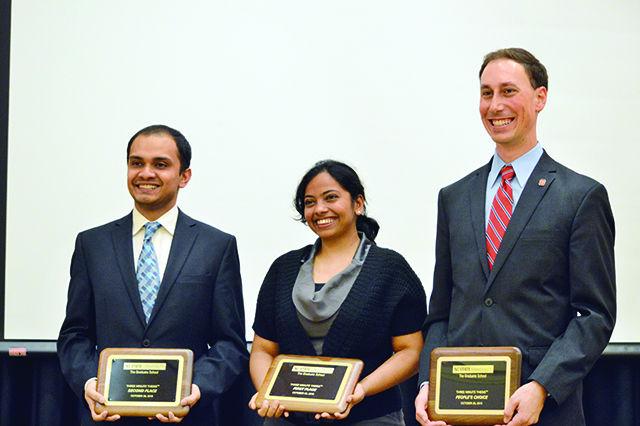Haritha Malladi, an NC State Ph.D. candidate studying civil engineering, won first place and $1,000 Wednesday at the annual Three Minute Thesis competition for her presentation on more sustainable roads.
The Three Minute Thesis competition is an international competition in which Ph.D. candidates present their theses, a process that can sometimes take up to nine hours, in fewer than three minutes. This challenges the doctoral students to condense their impressive research into a format that is easily understood by the public. Competitors were judged on comprehension and the content of the material, as well as the presentation’s level of engagement.
Malladi’s presentation, “Reduce and Recycle: How to Turn Our Black Roads Green,” addressed the issue surrounding roads in the United States.
“The United States has the longest road network in the world with enough roadway to circle the globe over 100 times,” Malladi said.
This vast road network creates an enormous energy footprint from the amount of heat that must be generated to produce all the asphalt. Part of Malladi’s solution, and the subject of her research, were new lower temperature asphalt mixtures. Because the asphalt doesn’t need to be heated to as high of a temperature when it is being produced, it takes less energy. This material would also be easier to recycle when new roads needed to be built and would also save the construction industry 30 percent on its initial costs.
Tahmid Latif, a Ph.D. candidate studying electrical and computer engineering, was the competition’s first runner-up, and Mathew Melillo, a doctoral candidate studying biochemical engineering, won the People’s Choice Award.
Latif’s presentation was about his research on the use of electronically controlled roaches in first responders’ efforts.
“We believe these roach bots will be able to help first responders save valuable time while remaining cost effective,” Latif said.
The bugs would be controlled by small electrical impulses sent into their antennae by electrodes placed on their backs. His research aimed to answer two questions: How well would these electrodes perform over time and how do they affect the roaches? The bugs would be used to save responders time by mapping the area.
Melillo presented his research on how liquids interact with various polymer materials. He compared the process of creating these polymers to spaghetti and meatballs, using the metaphor to explain the complex connection of polymer chains. He explained that by altering these connections, he could create rigid and flexible polymers. This kind of research can help create specific polymer materials like the ones used to help tires grip better in the rain.
Wednesday’s competition featured the 10 finalists out of 28 original competitors from the preliminary round. The other competitors included Karim El Roz, Gareth Jones, Johnsie Lang, Jing Li, Doreen McVeigh, Sonika Rawal and Rahnuma Shahrin.








